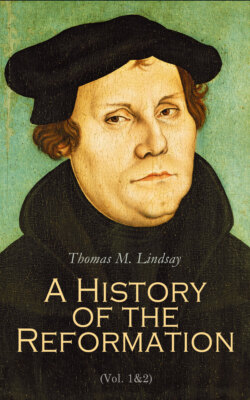Читать книгу A History of the Reformation (Vol. 1&2) - Thomas M. Lindsay - Страница 59
На сайте Литреса книга снята с продажи.
§ 6. The Indulgence-seller.
ОглавлениеTable of Contents
What drew Luther from his retirement was an Indulgence proclaimed by Pope Leo x., farmed by Albert of Brandenburg, the Archbishop of Mainz, and preached by John Tetzel, a Dominican monk, who had been commissioned by Albert to sell for him the Papal Letters, as the Indulgence tickets were called. It had been announced that the money raised by the sales would be used to build the Basilica of St. Peter to be a tomb worthy of the great Apostle, who rested, it was said, in a Roman grave.
The Indulgence-seller had usually a magnificent reception when he entered a German town. Frederick Mecum (Myconius), who was an eye-witness, thus describes the entrance of Tetzel into the town of Annaberg in Ducal Saxony:
“When the Commissary or Indulgence-seller approached the town, the Bull (proclaiming the Indulgence) was carried before him on a cloth of velvet and gold, and all the priests and monks, the town council, the schoolmasters and their scholars, and all the men and women went out to meet him with banners and candles and songs, forming a great procession; then all the bells ringing and all the organs playing, they accompanied him to the principal church; a red cross was set up in the midst of the church, and the Pope's banner was displayed; in short, one might think they were receiving God Himself.”
The Commissary then preached a sermon extolling the Indulgence, declaring that “the gate of heaven was open,” and that the sales would begin.
Many German princes had no great love for the Indulgence-sellers, and Frederick, the Elector of Saxony, had prohibited Tetzel from entering his territories. But the lands of Ernestine (Electoral) and Albertine (Ducal) Saxony were so mixed up that it was easy for the Commissary to command the whole population of Electoral Saxony without actually crossing the frontier. The “Red Cross” had been set up in Zerbst in Ducal Saxony a few miles to the west, and at Jüterbogk in the territory of Magdeburg a few miles to the east of Wittenberg, and people had gone from the town to buy the Indulgence. Luther believed that the sales were injurious to the moral and religious life of his townsmen; the reports of the sermons and addresses of the Indulgence-seller which reached him appeared to contain what he believed to be both lies and blasphemies. He secured a copy of the letter of recommendation given by the Archbishop to his Commissary, and his indignation grew stronger. Still it was only after much hesitation, after many of his friends had urged him to interfere, and in deep distress of mind, that he resolved to protest. When he had determined to do something he went about the matter with a mixture of caution and courage which were characteristic of the man.
The Church of All Saints (the Castle Church) in Wittenberg had always been intimately connected with the University; its prebendaries were professors; its doors were used as a board on which to publish important academic documents; and notices of public academic “disputations,” common enough at the time, had frequently appeared there. The day of the year which drew the largest concourse of townsmen and strangers to the church was All Saints' Day, the first of November. It was the anniversary of the consecration of the building, and was commemorated by a prolonged series of services. The Elector Frederick was a great collector of relics, and had stored his collection in the church.150 He had also procured an Indulgence to benefit all who came to attend the anniversary services and look at the relics.
On All Saints' Day, Luther nailed his Ninety-five Theses to the door of the church. It was a strictly academic proceeding. The Professor of Theology in Wittenberg, wishing to elucidate the truth, offered to discuss, either by speech or by writing, the matter of Indulgences.151 He put forth ninety-five propositions or heads of discussion which he proposed to maintain. Academic etiquette was strictly preserved; the subject, judged by the numberless books which had been written on it, and the variety of opinions expressed, was eminently suitable for debate; the Theses were offered as subjects of debate; and the author, according to the usage of the time in such cases, was not supposed to be definitely committed to the opinions expressed.
The Theses, however, differed from most programmes of academic discussions in this, that everyone wanted to read them. A duplicate was made in German. Copies of the Latin original and the translation were sent to the University printing-house, and the presses could not throw them off fast enough to meet the demand which came from all parts of Germany.
